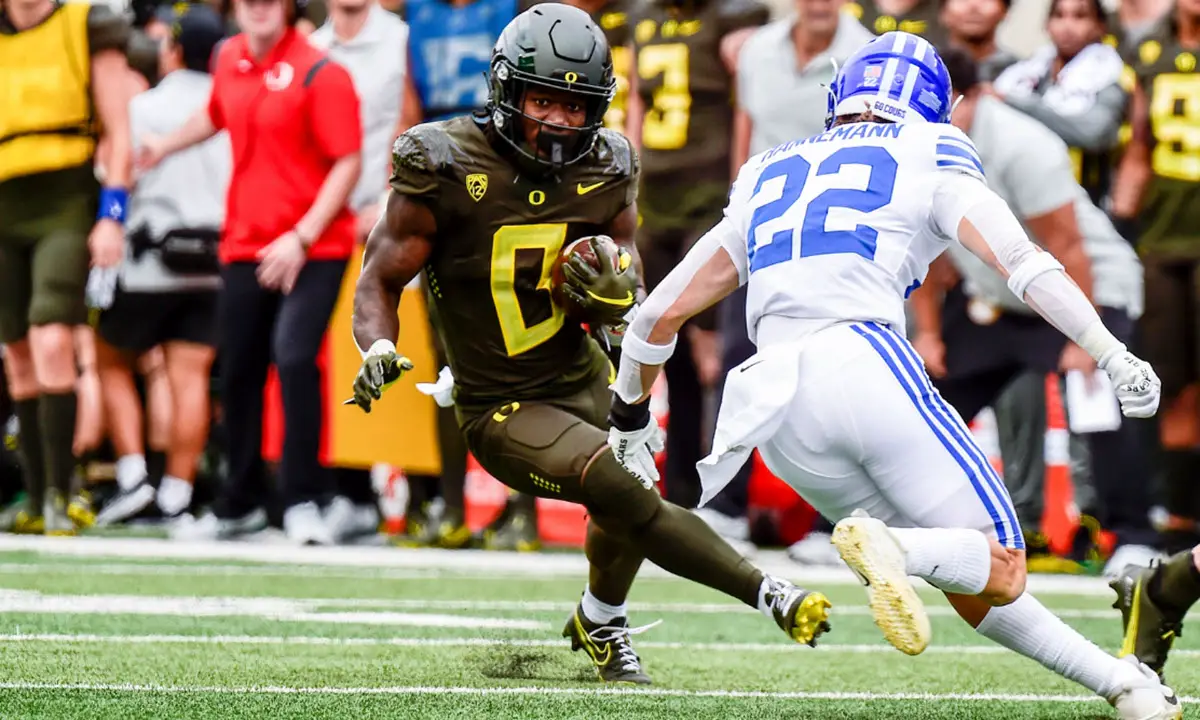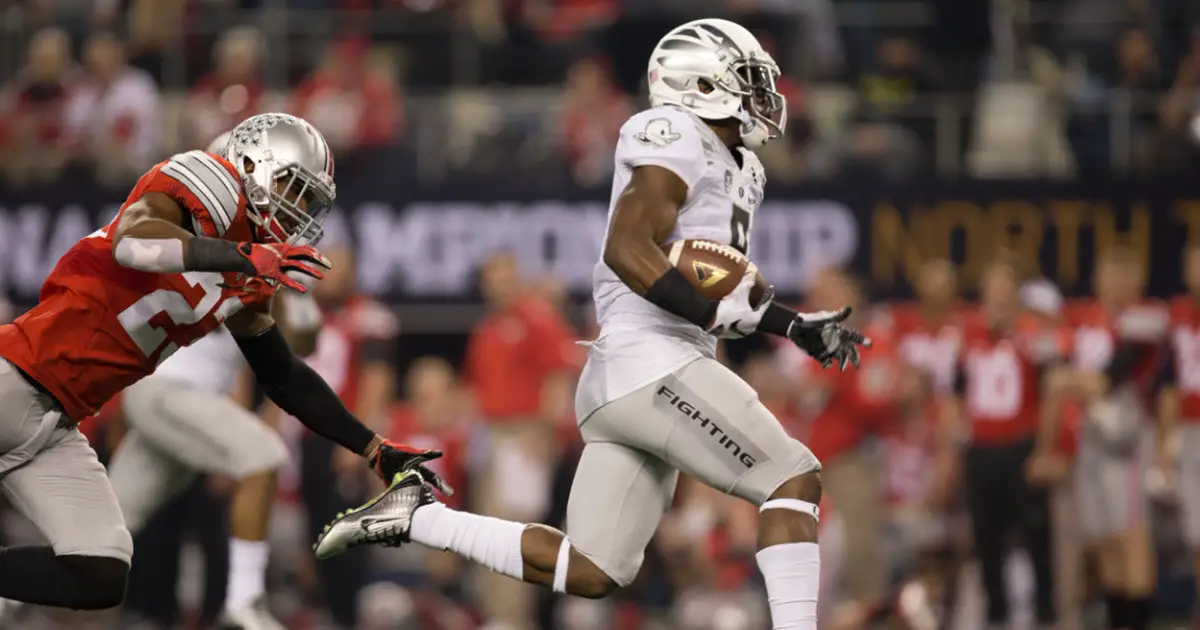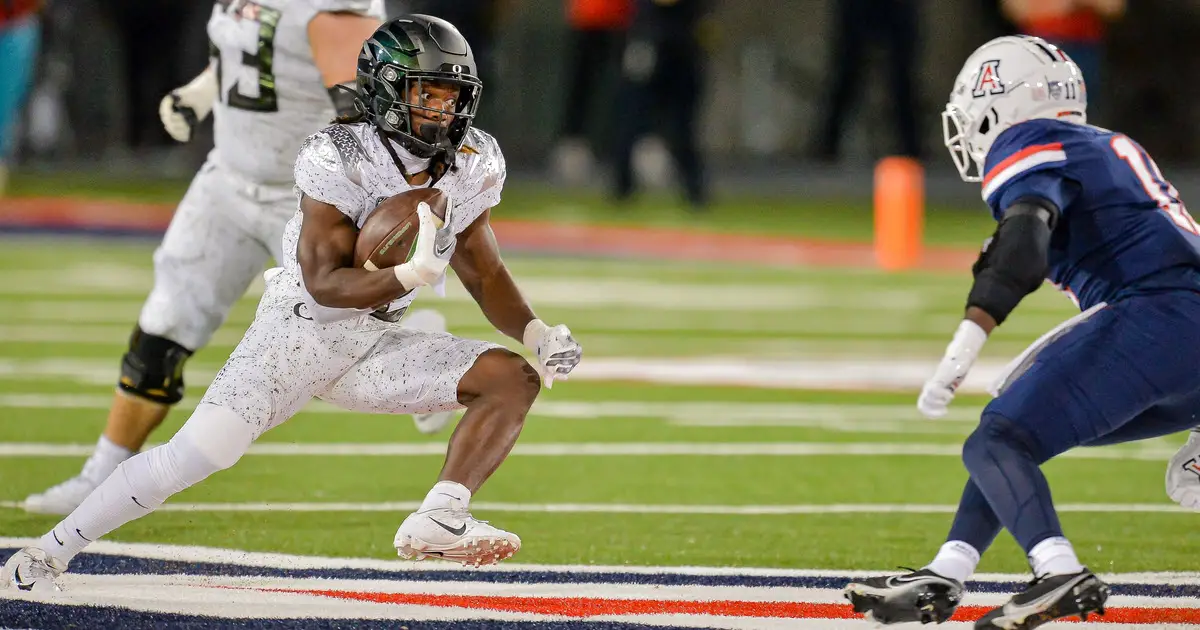Oregon has an incredible running back tradition with highly recognizable names such as Jonathan Stewart, LaMichael James, Kenyon Barner, De’Anthony Thomas and Royce Freeman, to name a handful. Oregon’s current roster is not lacking for talent either with a RB room featuring Bucky Irving (junior), Noah Whittington (junior), Jordan James (sophomore), Dante Dowdell (freshman) and Jayden Limar (freshman).
This is an incredible amount of talent, and it can be assumed that Irving and Whittington will continue to be the two featured backs as they were in 2022. James played a niche role last year as a short-yardage back, and his touches expanded during garbage time. This leaves the two freshman backs probably seeing a limited amount of playtime this coming season — not because they won’t be excellent backs for Oregon, but because getting five backs enough touches is an immense challenge.
Mr. FishDuck took a break from looking at Arizona Cardinal odds for next year along with other NFL betting lines, when we discussed the issue of this very deep ball-carrier group for the 2023 Ducks. He wondered if Dowdell wouldn’t end up as the No. 2 back by the end of the season, yet the question is “how many carries he would take from Bucky?”
This problem is magnified when looking at last year’s stats. It is abundantly clear that the Ducks did not utilize Irving’s talents nearly as much as they should, and I went into greater depth about it in this article. Simply put, Irving’s success at running the football was so much greater than the other runners. He averaged a full 1.2 yards more than all other runners, or to put it another way, Irving produced on average 21% more yards per carry. Irving’s production alone demands that he should be getting more touches per game.

Bucky Irving had the uncanny ability to make defenders miss last season. Photo by Eugene Johnson
But this creates another problem. If the Ducks expand Irving’s role, they will be taking touches away from Whittington and James, who have both proven their abilities and should get touches as well. Whittington is a different type of back from Irving, but he still runs with incredible speed and vision. James really showed he can be a power back last season, and he is really able to run right at a defense and challenge that defense to stop him, which more often than not felt like they couldn’t.
During the spring game both freshmen Dowdell and Limar showed some flashes of potential. Limar in particular seemed to sneak out of the backfield and find himself open for an easy pass, though he ended up dropping a few of those easy passes. He will grow with some more practice.
There is no shortage of talent on the Oregon roster; the biggest problem is how the coaches are going to manage to get this talent on the field. Oregon’s coaches could look to the past, as this is not the first time the Ducks’ roster was heavy with great RB options.

Byron Marshall could do it all for Oregon. (Photo by John Giustina)
During the 2014 season, Oregon had Byron Marshall, a thousand-yard rusher in 2013, and Thomas Tyner returning. The coaches were confronted with the conundrum as to how to get Freeman on to the field. They managed to get Freeman as much playing time as they did because they moved Marshall to wide receiver. This solved two problems for that 2014 squad, as they needed to keep Marshall on the field while also getting Freeman in play — but that team also lacked depth at WR.
That is certainly not the case for this Oregon team. The Ducks are absolutely loaded at wide receiver heading into this season. So looking to the past for solutions will not work in this case, because this team is probably Oregon’s best talent-wise, at least on paper.
This is an incredible problem for Dan Lanning, Carlos Locklyn, and Will Stein to have and I have every confidence the three of them will find an adequate solution to this abundance of riches. How would you divide the touches?
David Marsh
Portland, Oregon
Top Photo By: Joe Jackson Jr.

Natalie Liebhaber, the FishDuck.com Volunteer Editor for this article, works in the medical technology industry in SLC, Utah.

David Marsh is a high school social studies teacher in Portland, Oregon. As a teacher he is known for telling puns to his students who sometimes laugh out of sympathy, and being both eccentric about history and the Ducks.
David graduated from the University of Oregon in 2012 with Majors in: Medieval Studies, Religious Studies, and Geography. David began following Ducks Football after being in a car accident in 2012; finding football something new and exciting to learn about during this difficult time in his life. Now, he cannot see life without Oregon football.

